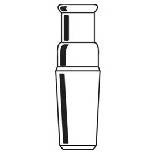 Loading... Please wait...
Loading... Please wait...Categories
- Home
- Lab Supplies
- Glassware
- Dissimilar Size Adapters
Dissimilar Size Adapters
Adapters are manufactured from borosilicate glass, which is internationally recognized as the premium raw material for laboratory grade glassware due to its physical and chemical characteristics.
Used to connect dissimilar standard ground joint sizes.
Lower inner joint is larger in size than top outer joint.
Bulk Savings: Buy 6 or more and save 10%!
Free Shipping within the Continental USA
Glass Adapter Technical Data:
Composition:
| SiO2 | 80.4% |
| AI2O3 | 2.4% |
| B2O3 | 13.0% |
| Na2O | 4.2% |
Physical Properties:
Glass type: Hard Borosilicate Glass Linear.
| Coefficient of expansion (20oC - 300oC) | 3.3x10-6K |
| Annealing point | 560±10oC |
| Density, Annealed | 2.23g/cm3 |
| Softening point | 820±10oC |
| Hydrolytic resistance | Type 1 glass |
| Acid resistance | Type 1 glass |
| Alkali resistance | Type 1 glass |
Temperature Resistance:
Thermal resistance is a good gauge to how well the glass handles high heat and yet retains its shape and structural integrity. Factors that should be specially considered are softening temperature and coefficient of heat. Our borosilicate glass has high softening temperatures and low coefficient of heat enabling our glassware to withstand heat and also have a higher range of working temperatures. Special care must still be taken at temperatures above 140oC to heating and cooling to be done in a most uniform manner.
Chemical Resistance:
Borosilicate glass has a very high resistance to attack from water, acids, salt solutions, halogens and organic solvents. Only concentrated phosphoric acid and strong alkaline solution cause significant corrosion of the glass.
| Conditions | Standard | Class |
|---|---|---|
| Water at 98 | ISO 719 | HGB1 |
| Water at 121 | ISO 720 | HGA1 |
| Acid | ISO 1776 | HGA1 |
| Boiling water solution of alkali | ISO 695 | HGA2 |

